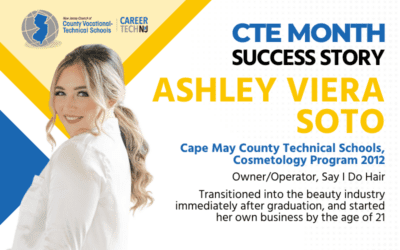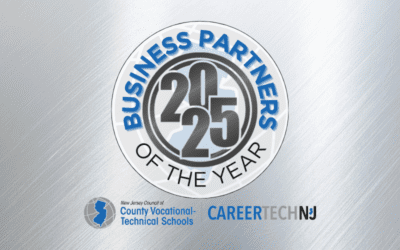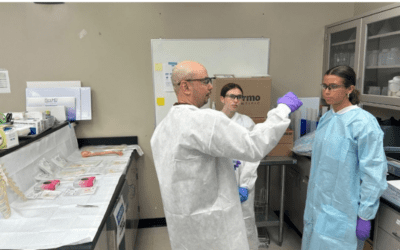
Newark Tech High School students Doussou Toure and Tatiyyanah Nelums.
NEWARK, NJ — When Newark Tech High School students Doussou Toure and Tatiyyanah Nelums walk into graduation next month, they will already have an associate’s degree in hand before they receive their high school diplomas.
By getting a two-year head start on their college education, Doussou and Tatiyyanah were among the 23 Newark Tech students and 200 students from 11 county vocational-technical high schools across the state that will graduate from high school this year with an associate’s degree from their local county college.
For students who pursue the opportunity to earn an associate’s degree while finishing high school, the payoff is big. By kickstarting a two-year college education, not only does the program help students get a more clear sense of their career focus, but they are also saving tens of thousands of dollars along the way.
County vocational-technical schools collaborate with community colleges like Essex County College and four-year institutions to align their academic and career programs to create seamless pathways for students. Students have the option of taking additional college courses on their own in order to complete the two-year associate’s degree before the end of high school.
By taking classes at Essex County College, Doussou said she wanted to join the program to equip her for academic success as she pursues a degree in medicine at Emory University in Atlanta upon graduation this June.
“I thought that it would help get an idea of what the college experience would be like but also help me get ahead of my classmates when I actually got to college,” Doussou said. “I’m very thankful for it, and I think it’s going to help me a lot with my future and what I want to do when I get older.”
Alongside earning credits for college-level work, some programs also allow students to build upon the credits offered with additional coursework on their own time.
The opportunities vary by county, with some classes taught by high school teachers who have been approved by colleges to teach post-secondary courses, and others taught by faculty on the community college campus.
At some vocational schools, students start taking college courses as early as their freshman year, and the majority of students gain college-level experience by their senior year.
“The accomplishment of these students is extraordinary, and our colleges are committed to enhancing these dual enrollment programs, which provide affordable pathways to post-secondary education while speeding up students’ preparation for the workforce,” said Aaron Fichtner, president of the New Jersey Council of County Colleges.
While Doussou will take her academic talents down south to Atlanta in the fall, Tatiyyanah said she plans to go up north to Syracuse University upon graduation to pursue a degree in aerospace engineering.
Before she steps on campus at the New York school though, she noted that her experience taking courses at Essex County College has already given her a leg up heading into freshman year in the fall.
“I thought [the program] was very interesting because I have always been very academically driven, so I thought, ‘Let’s see if this is a challenge for me’,” she said. “It gives me a feel of what college courses are actually like, and now I have an appreciation for the amount of work that I need to have to maintain a good college life.”
For any high school student that wants to move one step closer to achieving their higher education goals to attain a four-year degree, Doussou encouraged students to take advantage of programs like this.
In addition to getting a feel for a college course workload, she said it will also help students get a taste of campus life.
“Any other student who gets an opportunity to do a program like this, I would highly recommend it,” she said. “It gives you a lot of different perspectives and an idea of the regular course workloads in a college setting.”



